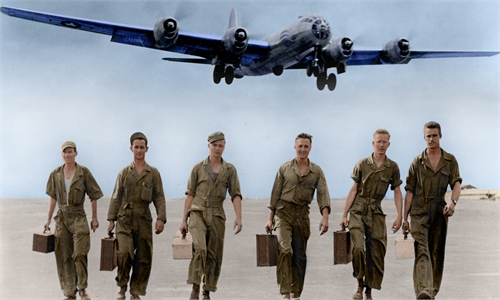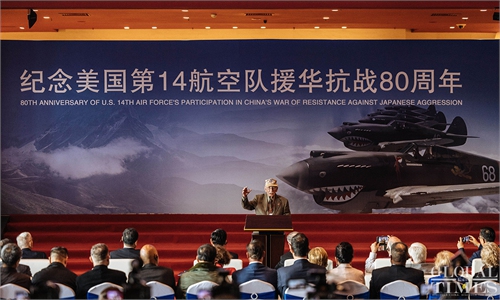IN-DEPTH / IN-DEPTH
‘Never repeat mistakes of past’: People in Russia, Europe reflect on lessons of World War II for today’s world
"History is the life of nations and of humanity," In War and Peace, the great writer Leo Tolstoy observed.
This year marks the 80th anniversary of the victory of the Chinese People's War of Resistance Against Japanese Aggression, the Soviet Union's Great Patriotic War, and the World Anti-Fascist War. May 8 marks the Victory in Europe Day during the World War II (WWII), while May 9 is celebrated in Russia as Victory Day of the Great Patriotic War.
As the world faces growing instability and the acceleration of profound global changes unseen in a century, how do people in Europe and Russia view the history of WWII today?
The Global Times recently interviewed citizens and scholars from Russia, the UK and Germany to learn how these countries approach World War II education and how they interpret the contemporary relevance of that historical period.
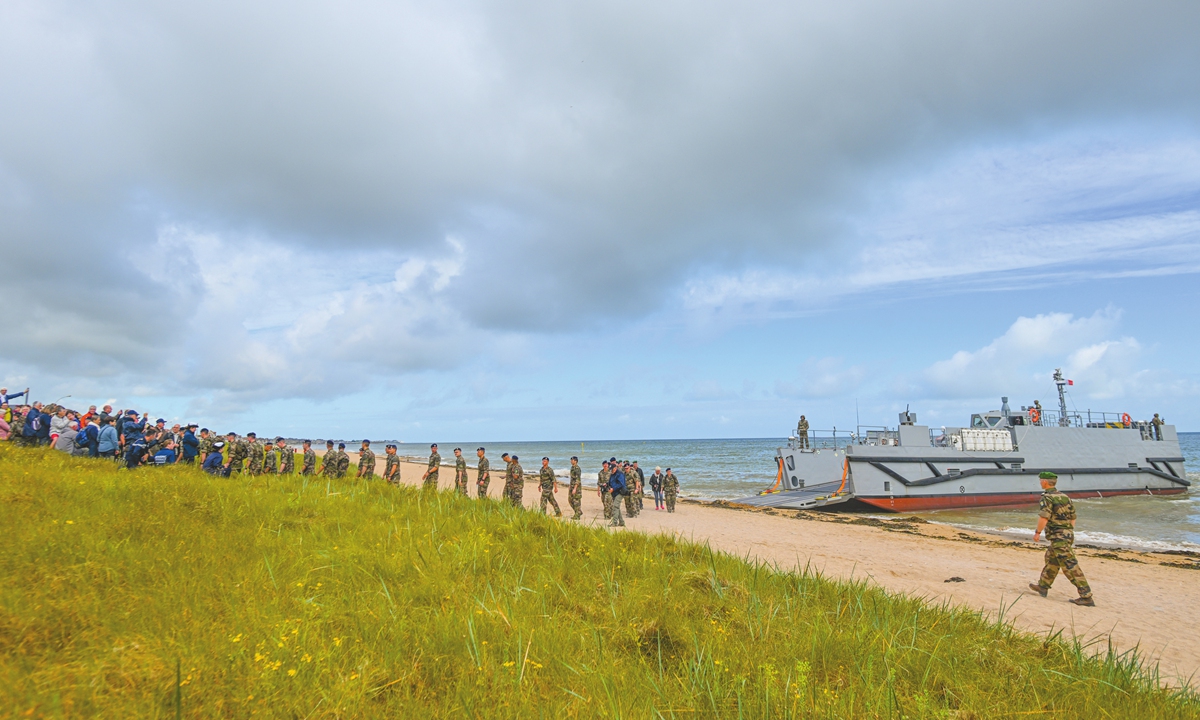
No 'self' in the face of the nation
"Eighty years is a long enough time for any moral tale to become blurry," The Washington Post wrote in a report published on May 6.
Today in Russia, World War II remains an important part of the school curriculum.
Xiao Li, a Chinese student who studied in Russia for six years, recalled how the country integrates WWII education into its curriculum.
"From elementary to higher grades, Russia incorporates a variety of Great Patriotic War-themed courses and activities, including classroom lectures, film screenings, drawing competitions, interviews with veterans, and patriotic song lessons," he said.
When he was in graduate school, his professor, who was in his seventies, once assigned the class to watch the 1970s Soviet war film Only Old Men Are Going to Battle, write a reflection, and present it in class.
"Many of the Russian students had never seen the film. Professor told us, 'Young people must learn to value today's freedom and peace, which were earned by the lives of countless soldiers.'"
Maksim Vilisov, Leading Research Fellow at the Institute of Scientific Information for Social Sciences of the Russian Academy of Sciences, told the Global Times that both his paternal and maternal grandfathers fought in the war. One served on the European front from 1942 to 1945 and celebrated victory in Austria, while the other joined the Soviet army's efforts in Asia in 1945, fighting alongside Chinese soldiers and civilians against Japanese militarism.
Vilisov said that their stories deeply shaped his view on life.
"There is no 'self' in the face of the nation. During extraordinary times, we must make choices to protect our country and families. I'm deeply proud of them."
"The central lesson of World War II is clear: Never repeat the mistakes of the past," Vilisov said.
Memorizing fading history
As the World War II generation fades, leaving the war as a story in books and memories, how will its lessons endure? In European countries like the UK and France, people preserve that history through dedicated efforts like battlefield tours, memorials, and educational programs.
In 2001, the HBO TV series Band of Brothers premiered, with British actor Matthew Leitch portraying Sergeant Floyd Talbert from Easy Company, 2nd Battalion, 506th Parachute Infantry Regiment, in the 101st Airborne Division of the US Army, vividly recreating the legendary unit's exploits on the European battlefields during the World War II.
The series not only moved global audiences with its gripping war stories but also gave Leitch a profound understanding of the weight and significance of this particular world war. Now, having stepped away from acting, he continues to share this history with the public through an organization he founded.
"It was a time when guys from farms, who would never leave their homes, were trained, flew over and jumped into a country, and liberated [it] from maniacs," Leitch told the Global Times. "That's what they did and that's why they ended up being known as the greatest... It was the case from the Western allies, as well as the Red Army and China. And the only way out of it was to fight for their freedoms."
Like many European families, Leitch's family includes members who experienced the World War II. His maternal grandfather was a member of "the Chindits," a British special force fighting in the jungles of Myanmar against the Japanese. His paternal grandfather was a veteran of the Dunkirk evacuation, later serving in the artillery.
However, Leitch knows little about the details of their battlefield experiences, as the "generation war" often refrained from discussing their wartime past.
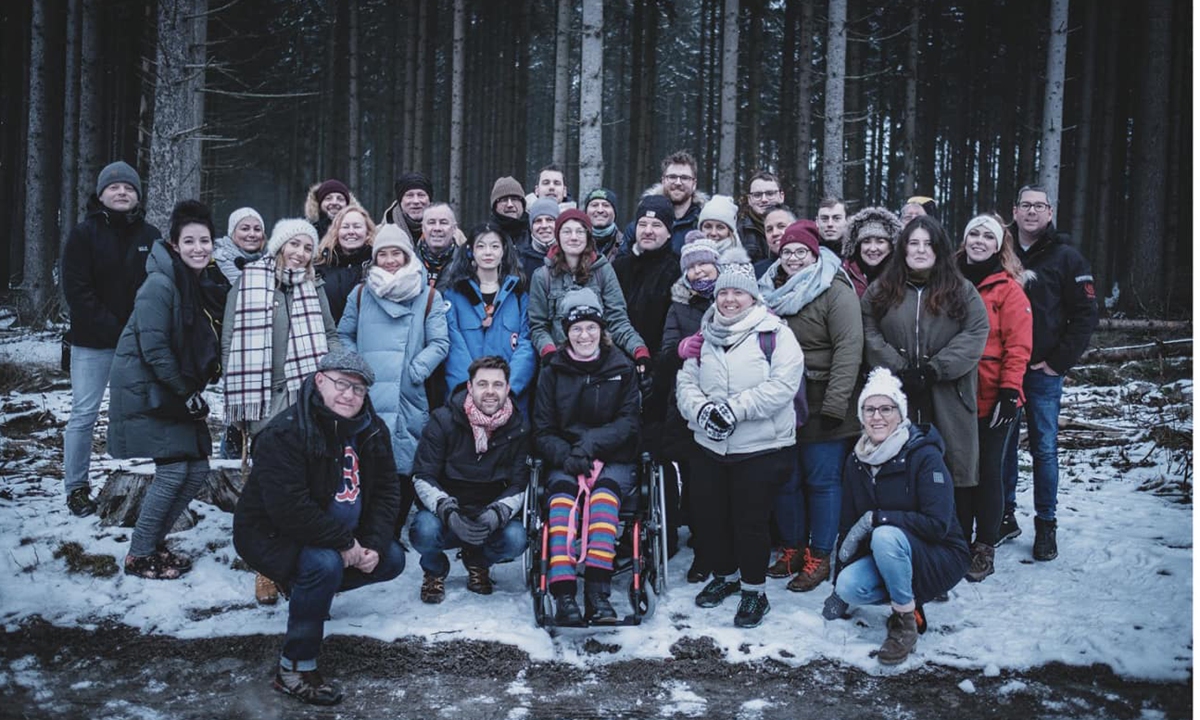
In 2000, Leitch auditioned for Band of Brothers. Before filming officially began, the actors underwent 10 days of intensive "bootcamp" under the guidance of retired officers. From physical conditioning to tactical drills, the training aimed to comprehensively shape an authentic portrayal of soldiers.
The 10-eposide series became a global sensation upon release. In 2003, it was introduced to China by state broadcaster CCTV, gaining a wide audience.
Over the past two decades, Leitch has maintained a close connection with the series - cast members not only hold regular reunions but have also forged deep bonds with the veterans they portrayed and their families.
Several years ago, Leitch founded "We Happy Few 506" - inspired by the line "We few, we happy few, we band of brothers" from Shakespeare's Henry V.
Initially, the organization focused on online podcasts, inviting actors, directors, and historians to discuss Band of Brothers and its historical context. In recent years, "We Happy Few 506" began organizing battlefield tours, guiding history enthusiasts through World War II sites such as Normandy, Bastogne, and remnants of Operation Market Garden.
Though the team is small, consisting of Leitch, a few like-minded friends, and professional guides, the activities are diverse and engaging, blending education with enjoyment - from trench experiences to casual beer nights. "We use the interest that has been generated by Band of Brothers to get people involved," he said.
To recreate a vivid war experience, Leitch would drag his tour groups to Bastogne's icy foxholes at 5 am in January, letting them shiver and imagine starving soldiers dodging Nazi shells, quipping, "Now imagine you've got half the clothing, no food for days, and Germans firing at you!"
Talking about today's education on World War II, Leitch observes that Europe and the US tend to focus on national contributions, with little emphasis on the Eastern Front, and the significant roles of China and other countries.
He believes that continuing to tell World War II stories is about honoring the people who made extraordinary sacrifices under immense pressure.
One of Leitch's collaborators, Paul Woodadge, is a British historian immersed in World War II history, now residing in Normandy, France. As a professional guide, author, and YouTube creator, he engages daily with historians, shares World War II stories, and contributes to TV productions and conference lectures, dedicated to preserving the war's memory.
Driven by a deep interest in the World War II, Woodadge chose to settle in Normandy - a global pilgrimage site attracting around 5 million visitors annually - where he became an expert through decades of fieldwork and self-study.
"Normandy is the place to have a career talking about D-Day, which is still the biggest, most talked-about battle in the Western world," he told the Global Times. "Today, you cannot drive through Normandy without World War II hitting you in the face."
After years of working on World War II history, Paul Woodadge has distilled its enduring lesson: "I think that we are better as a species if we work together, have dialogue, and come together."
He also recognized that as World War II veterans gradually pass away, future generations of children will no longer have the opportunity to hear firsthand accounts of the war. Instead, they will increasingly need to rely on historical records to understand this period of history.
Never-ending alarm
Germany's commemorative activities for the 80th anniversary of the end of the war began in mid-April and will culminate on May 8 and 9. According to German broadcaster RBB on May 5, more than 60 events are planned in Berlin and Brandenburg alone during that period. The Berlin state government has also declared May 8 a one-time public holiday.
One of the focal points of this year's commemorations is the Museum Berlin-Karlshorst, located at the historical site where the German army surrendered in Berlin. The museum was established to commemorate the history of the World War II.
Jörg Morré, director of the museum and a historian, told the Global Times that the museum's permanent exhibition on the history of Germany and the Soviet Union during World War II has remained unchanged.
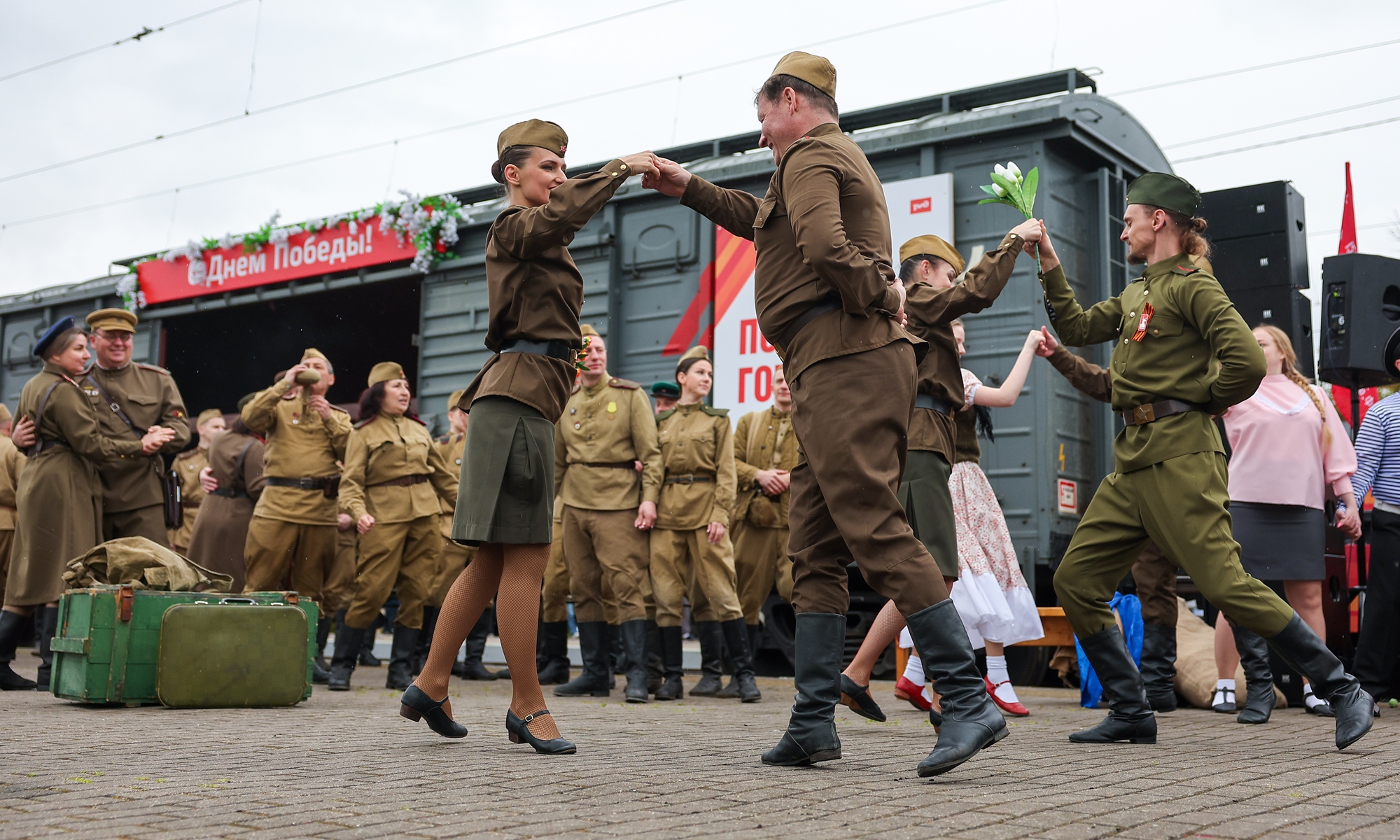
Christian Wagner, a young German scholar currently conducting research at Peking University, said, "Germany's memorial culture about the World War II is strongly rooted in our mentality. In our schools we learned very early the terrible actions of Nazi Germany and Hitler, and fascism such as racial discrimination or discrimination against minorities."
However, Wagner also shared some concerns about the current situation. "I think the young generations in Europe cherish the lessons from history. They don't want war. But the problem is the power of propaganda and media which are influencing their perception. Nobody talks about peace; media and politicians only talk about war. So people think they have no other choice…"
"Peace is the greatest good in civilization. The voice of peace and diplomacy must be stronger than the voice that pushes for war and destruction," he said.
This year marks the 80th anniversary of the victory of the Chinese People's War of Resistance Against Japanese Aggression, the Soviet Union's Great Patriotic War, and the World Anti-Fascist War. May 8 marks the Victory in Europe Day during the World War II (WWII), while May 9 is celebrated in Russia as Victory Day of the Great Patriotic War.
As the world faces growing instability and the acceleration of profound global changes unseen in a century, how do people in Europe and Russia view the history of WWII today?
The Global Times recently interviewed citizens and scholars from Russia, the UK and Germany to learn how these countries approach World War II education and how they interpret the contemporary relevance of that historical period.

People attend a ceremony marking the 80th anniversary of the Normandy landings in France on June 5, 2024. Photo: VCG
No 'self' in the face of the nation
"Eighty years is a long enough time for any moral tale to become blurry," The Washington Post wrote in a report published on May 6.
Today in Russia, World War II remains an important part of the school curriculum.
Xiao Li, a Chinese student who studied in Russia for six years, recalled how the country integrates WWII education into its curriculum.
"From elementary to higher grades, Russia incorporates a variety of Great Patriotic War-themed courses and activities, including classroom lectures, film screenings, drawing competitions, interviews with veterans, and patriotic song lessons," he said.
When he was in graduate school, his professor, who was in his seventies, once assigned the class to watch the 1970s Soviet war film Only Old Men Are Going to Battle, write a reflection, and present it in class.
"Many of the Russian students had never seen the film. Professor told us, 'Young people must learn to value today's freedom and peace, which were earned by the lives of countless soldiers.'"
Maksim Vilisov, Leading Research Fellow at the Institute of Scientific Information for Social Sciences of the Russian Academy of Sciences, told the Global Times that both his paternal and maternal grandfathers fought in the war. One served on the European front from 1942 to 1945 and celebrated victory in Austria, while the other joined the Soviet army's efforts in Asia in 1945, fighting alongside Chinese soldiers and civilians against Japanese militarism.
Vilisov said that their stories deeply shaped his view on life.
"There is no 'self' in the face of the nation. During extraordinary times, we must make choices to protect our country and families. I'm deeply proud of them."
"The central lesson of World War II is clear: Never repeat the mistakes of the past," Vilisov said.
Memorizing fading history
As the World War II generation fades, leaving the war as a story in books and memories, how will its lessons endure? In European countries like the UK and France, people preserve that history through dedicated efforts like battlefield tours, memorials, and educational programs.
In 2001, the HBO TV series Band of Brothers premiered, with British actor Matthew Leitch portraying Sergeant Floyd Talbert from Easy Company, 2nd Battalion, 506th Parachute Infantry Regiment, in the 101st Airborne Division of the US Army, vividly recreating the legendary unit's exploits on the European battlefields during the World War II.
The series not only moved global audiences with its gripping war stories but also gave Leitch a profound understanding of the weight and significance of this particular world war. Now, having stepped away from acting, he continues to share this history with the public through an organization he founded.
"It was a time when guys from farms, who would never leave their homes, were trained, flew over and jumped into a country, and liberated [it] from maniacs," Leitch told the Global Times. "That's what they did and that's why they ended up being known as the greatest... It was the case from the Western allies, as well as the Red Army and China. And the only way out of it was to fight for their freedoms."
Like many European families, Leitch's family includes members who experienced the World War II. His maternal grandfather was a member of "the Chindits," a British special force fighting in the jungles of Myanmar against the Japanese. His paternal grandfather was a veteran of the Dunkirk evacuation, later serving in the artillery.
However, Leitch knows little about the details of their battlefield experiences, as the "generation war" often refrained from discussing their wartime past.

Matthew Leitch (front row, second from left) and participants of "We Happy Few 506" visit war sites related to the Ardennes Offensive in Bastogne, Belgium, in January 2023. Photo: Courtesy of Leitch
In 2000, Leitch auditioned for Band of Brothers. Before filming officially began, the actors underwent 10 days of intensive "bootcamp" under the guidance of retired officers. From physical conditioning to tactical drills, the training aimed to comprehensively shape an authentic portrayal of soldiers.
The 10-eposide series became a global sensation upon release. In 2003, it was introduced to China by state broadcaster CCTV, gaining a wide audience.
Over the past two decades, Leitch has maintained a close connection with the series - cast members not only hold regular reunions but have also forged deep bonds with the veterans they portrayed and their families.
Several years ago, Leitch founded "We Happy Few 506" - inspired by the line "We few, we happy few, we band of brothers" from Shakespeare's Henry V.
Initially, the organization focused on online podcasts, inviting actors, directors, and historians to discuss Band of Brothers and its historical context. In recent years, "We Happy Few 506" began organizing battlefield tours, guiding history enthusiasts through World War II sites such as Normandy, Bastogne, and remnants of Operation Market Garden.
Though the team is small, consisting of Leitch, a few like-minded friends, and professional guides, the activities are diverse and engaging, blending education with enjoyment - from trench experiences to casual beer nights. "We use the interest that has been generated by Band of Brothers to get people involved," he said.
To recreate a vivid war experience, Leitch would drag his tour groups to Bastogne's icy foxholes at 5 am in January, letting them shiver and imagine starving soldiers dodging Nazi shells, quipping, "Now imagine you've got half the clothing, no food for days, and Germans firing at you!"
Talking about today's education on World War II, Leitch observes that Europe and the US tend to focus on national contributions, with little emphasis on the Eastern Front, and the significant roles of China and other countries.
He believes that continuing to tell World War II stories is about honoring the people who made extraordinary sacrifices under immense pressure.
One of Leitch's collaborators, Paul Woodadge, is a British historian immersed in World War II history, now residing in Normandy, France. As a professional guide, author, and YouTube creator, he engages daily with historians, shares World War II stories, and contributes to TV productions and conference lectures, dedicated to preserving the war's memory.
Driven by a deep interest in the World War II, Woodadge chose to settle in Normandy - a global pilgrimage site attracting around 5 million visitors annually - where he became an expert through decades of fieldwork and self-study.
"Normandy is the place to have a career talking about D-Day, which is still the biggest, most talked-about battle in the Western world," he told the Global Times. "Today, you cannot drive through Normandy without World War II hitting you in the face."
After years of working on World War II history, Paul Woodadge has distilled its enduring lesson: "I think that we are better as a species if we work together, have dialogue, and come together."
He also recognized that as World War II veterans gradually pass away, future generations of children will no longer have the opportunity to hear firsthand accounts of the war. Instead, they will increasingly need to rely on historical records to understand this period of history.
Never-ending alarm
Germany's commemorative activities for the 80th anniversary of the end of the war began in mid-April and will culminate on May 8 and 9. According to German broadcaster RBB on May 5, more than 60 events are planned in Berlin and Brandenburg alone during that period. The Berlin state government has also declared May 8 a one-time public holiday.
One of the focal points of this year's commemorations is the Museum Berlin-Karlshorst, located at the historical site where the German army surrendered in Berlin. The museum was established to commemorate the history of the World War II.
Jörg Morré, director of the museum and a historian, told the Global Times that the museum's permanent exhibition on the history of Germany and the Soviet Union during World War II has remained unchanged.

Artists perform during the arrival of the Troop Train of Victory at the railway station to mark the upcoming Victory Day of the Great Patriotic War in Kaliningrad, Russia, on May 4, 2025. Photo: VCG
The core area - the surrender hall - has been preserved in its original form and will not be altered under any circumstances. Tanks and military vehicles of the Soviet army remain on display in the museum's outdoor garden, but banners, placards, and badges are now prohibited in front of these exhibits.Christian Wagner, a young German scholar currently conducting research at Peking University, said, "Germany's memorial culture about the World War II is strongly rooted in our mentality. In our schools we learned very early the terrible actions of Nazi Germany and Hitler, and fascism such as racial discrimination or discrimination against minorities."
However, Wagner also shared some concerns about the current situation. "I think the young generations in Europe cherish the lessons from history. They don't want war. But the problem is the power of propaganda and media which are influencing their perception. Nobody talks about peace; media and politicians only talk about war. So people think they have no other choice…"
"Peace is the greatest good in civilization. The voice of peace and diplomacy must be stronger than the voice that pushes for war and destruction," he said.

